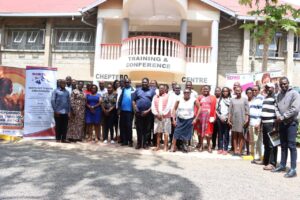PMI Africa Conference Shines a Spotlight on Kenya’s Strategic Vision for Renewable Energy

On the second day of PMI Africa Conference, the focal point of the day’s proceedings included the critical discussion on Kenya’s strategic vision for its energy sector. Following the recently concluded Africa Climate Summit, the conference highlighted the collective work being done towards Kenya’s ambitious goals in the energy sector and how they align with Africa’s ambitious Agenda 2063.
Agenda 2063 has set ambitious goals, including raising the share of renewable energy sources (wind, solar, hydro, bio, and geothermal) in total energy production by at least 10%, reducing the proportion of fossil fuels in total energy production by at least 20%, and increasing electricity generation and distribution by a minimum of 50%.
“As Africa marks a decade into the pursuit of its ambitious Agenda 2063, the PMI Africa conference emerges as a crucial spotlight, celebrating the momentum of the region’s project-based economy. The conference underscores the extraordinary work companies and governments across the continent are doing to ensure that large-scale projects align with Agenda 2063 strategic goals around economic growth, generating jobs, and creating resilient infrastructure fit for purpose,” statement by Hon. Davis Chirchir Cabinet Secretary, Ministry of Energy and Petroleum.

“Renewable sources currently account for approximately 93% of the power dispatched in Kenya. This achievement has not happened by accident; it has been a deliberate effort by the government and the ministry. Our ultimate goal is to reach 100% green energy, and we will continue to see this percentage increase with the passage of time,” said Joseph Siror, Managing Director of Kenya Lighting and Power Company.
Siror emphasised the importance of public-private partnerships, stating, “We are collaborating with neighboring countries, including Tanzania, Uganda, Rwanda, Burundi, and Somalia. The intention is to link the power points together with the goal of interconnecting countries so that the available resources can benefit the entire region through improved infrastructure.”
Led by industry experts, the two days have focused on critical topics such as artificial intelligence (AI), climate change, safeguarding the digital future, and education. These sessions underscored the importance of public-private partnerships in addressing pressing global challenges, fostering innovation, and accelerating Kenya’s Digital Master Plan.
“A successful transition will require project managers to develop green skills,” says George Asamani, MD, PMI Sub Saharan Africa.

“Green skills encompass a broad range of technical knowledge and expertise related to environmentally friendly technologies and processes. Individuals with these skills are better equipped to contribute to green industries and initiatives. Although green competencies are relevant to everyone, they are of greater importance to project managers who are ideal candidates to lead the just transition.” (Ends)





